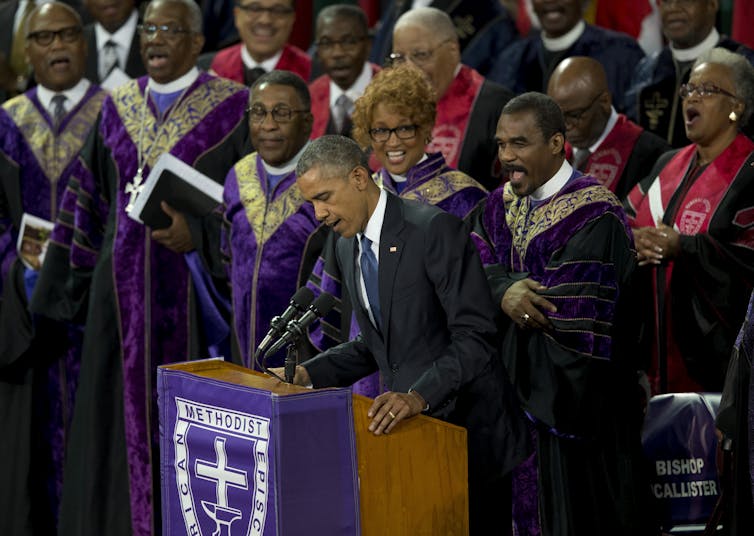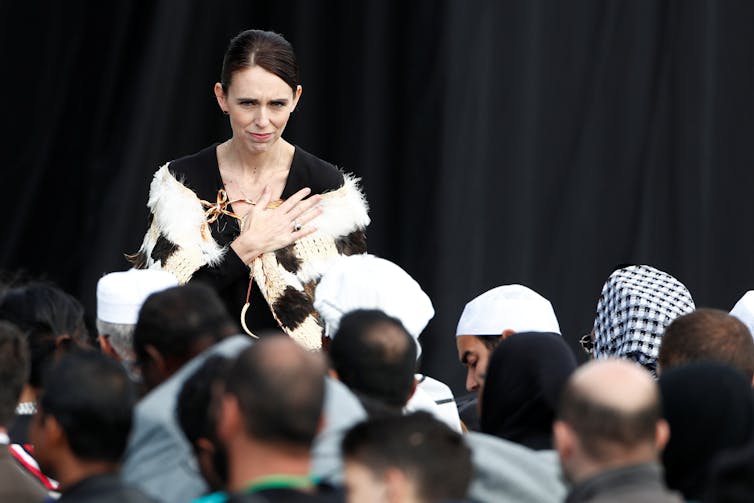Is there a 'feminine' response to terrorism?
- Written by Mona Krewel, Assistant Professor, Department of Government, Cornell University
After a terrorist shot and killed 50 people in two mosques in Christchurch, New Zealand, in March, Prime Minister Jacinda Ardern responded differently[1] than most leaders have after similar attacks.
Usually, history shows, presidents and prime ministers try to appear rational[2] after terrorism. They reassure people that the situation is under control, thank police and other first responders and offer updates on the investigations. Other world leaders, most of them male, have reacted by launching mass surveillance of the public[3], repressing civil liberties[4], strengthening law enforcement[5] or calling for a “war on terror[6].”
Ardern demonstrated a more compassionate and empathetic handling of the Christchurch shootings.
She wore a headscarf when comforting[7] Muslim victims and mourners. She cried. Her government offered to pay all funeral costs[8] for the victims, regardless of immigration status. And Ardern responded forcefully on the legislative front, pushing new gun control measures[9] through parliament, banning military-style assault weapons in New Zealand.
Arden has been almost universally praised for her leadership through this crisis[10], which some have identified as a “feminine[11]” management style. Her approval ratings[12] are the highest since she took office.
We wanted to understand how, exactly, Ardern acted differently than a man when facing down terrorism – if in fact she did.
Our study: Categorizing leadership style
To assess Arden’s “feminine” approach to terrorism, we have compared her rhetoric to that of other world leaders in the immediate aftermath of similar mass shootings – that is, lone wolf attacks that resulted in two or more deaths and were motivated by right-wing ideology[13].
Six shooting incidents over the past 50 years meet all these criteria. They are: Norway’s Utøya shooting[14] in 2011; the Wisconsin Sikh temple shooting[15] in 2012; the Charleston, South Carolina, United Methodist Church shooting[16] in 2015; Canada’s Quebec mosque attack[17] in 2017; last year’s Pittsburgh synagogue shooting[18]; and the Christchurch mosque shooting.
Our analysis therefore covered five different leaders’ reactions to domestic terrorism: Norwegian Prime Minister Jens Stoltenberg, U.S. President Barack Obama, U. S. President Donald Trump, Canadian Prime Minister Justin Trudeau and New Zealand Prime Minister Ardern.
For each leader, we analyzed every sentence of their immediate post-attack statements – both spoken and written – and noted whether it focused on the perpetrator, the victims, both parties or neither. In total, we coded 314 sentences in this manner.
Men lament victims, too
Arden made headlines after Christchurch for talking about the victims and refusing to say the attacker’s name, denying him notoriety[19].
We found that all the male leaders in our sample also expressed empathy with the victims and, to a great extent, focused on the dead and injured rather than the perpetrator. Two actually focused their post-attack comments more strongly on the victims than Ardern, who devoted about 40% of her comment to the Christchurch victims.
Nearly 44% of Prime Minister Stoltenberg’s sentences centered on victims, and he did not mention the terrorist at all. Stoltenberg said he was “unable to express with words[20]” the depth of his feelings about the 77 people killed on Utøya island, many of whom were children at summer camp.
Canadian Prime Minister Justin Trudeau – who mourned Quebec’s slain Muslim worshippers[21] as “brothers, uncles, fathers and friends” – followed, focusing 41% of his statement on the victims.
The two U.S. presidents in our analysis least emphasized the victims.
Obama, who shared his “deep sorrow over the senseless murders[22]” of black worshippers in South Carolina, spoke about shooting victims in just 18% of his post-attack statements. Trump dedicated less than 5% of his speech after the Pittsburgh synagogue shooting[23] to the dead.
 President Barack Obama at a memorial service for the United Methodist Church worshipers killed in South Carolina in 2015.
AP Photo/Carolyn Kaster[24]
President Barack Obama at a memorial service for the United Methodist Church worshipers killed in South Carolina in 2015.
AP Photo/Carolyn Kaster[24]
Both Obama and Trump spoke much more about the criminal investigations underway, the law enforcement response and how their government was handling the situation.
This emphasis on power – and, by implication, the strength of the nation’s leader – appears to be something of a male response to mass shooting. All the men in our sample dedicated at least half of their post-attack reactions to such topics.
Ardern, a woman, was the only leader in our sample who focused more than half of her comments on the human beings involved in the terrorist attack.
When stereotypes work for women
Ardern’s response to terrorism differed, too, in how openly she expressed her sadness[25].
Crying in public can be a political liability for both male and female politicians[26], according to Dartmouth professor Deborah Jordan Brooks. When President Obama in 2016 struggled to hold back tears[27] after the Sandy Hook school shooting, for example, Fox News mocked him[28]. Research shows that women leaders are penalized particularly harshly[29] for showing emotion.
Ardern, however, has not been judged for crying in Christchurch. Traditional gender roles depict women[30] as “emotional.” Perhaps, in this time of tragedy, social expectations actually worked in her favor.
 Jacinda Ardern at a service for the victims of the Christchurch mosque shootings in March.
Reuters/Edgar Su[31]
Jacinda Ardern at a service for the victims of the Christchurch mosque shootings in March.
Reuters/Edgar Su[31]
Another stereotypically female characteristic[32] – empathetic caring for the needs of others – was also on display after the Christchurch attack.
Ardern’s use of the Muslim headscarf when visiting the scene of the crime[33], for example, was more than cultural sensitivity. It visually conveyed that Muslims are welcome in New Zealand. Muslim leaders worldwide praised the prime minister[34] for her compassionate gesture, and many non-Muslim women in New Zealand soon followed her lead[35].
Even the Ardern government’s policy responses were arguably driven by empathy. Her government offered to pay funeral costs and made tax-free “survivor grants” available for the partners, children and dependents of the victims.
Research shows that women experience indirect but disproportionate harms when male heads of households die[36] from violence. The survivor grants indicate that Ardern considered women’s specific needs in planning government assistance.
Worldwide[37], research shows, female leaders[38] are most likely to champion these kinds of social welfare policies[39] when in office.
After armed conflicts, female leaders[40] also tend to shift resources from military spending to social welfare, prolonging peace.
Women being women
There are, of course notable exceptions[41] to the idea that female leaders are more compassionate, nurturing or nonviolent leaders.
As U.S. secretary of state, Hillary Clinton advocated for a U.S. military involvement[42] to conflicts in Libya and Syria. British Prime Minister Margaret Thatcher[43] also started war while in office, and famously slashed government funding for Britain’s social welfare services[44].
Ardern’s willingness to embrace an openly female leadership style is a relatively new phenomenon. In the past, many women have felt the need to adopt traditionally masculine traits to succeed in the male-dominated world of politics.
In doing so, Ardern has showed the world that feminine leadership isn’t just acceptable – it is also, in times of trouble, a powerful force[45].
References
- ^ differently (www.newyorker.com)
- ^ try to appear rational (www.washingtonpost.com)
- ^ mass surveillance of the public (www.vox.com)
- ^ repressing civil liberties (www.newsweek.com)
- ^ strengthening law enforcement (www.tandfonline.com)
- ^ war on terror (www.history.com)
- ^ wore a headscarf when comforting (www.washingtonpost.com)
- ^ offered to pay all funeral costs (www.cbsnews.com)
- ^ pushing new gun control measures (www.bbc.com)
- ^ praised for her leadership through this crisis (www.theatlantic.com)
- ^ feminine (www.tandfonline.com)
- ^ approval ratings (www.nytimes.com)
- ^ motivated by right-wing ideology (theconversation.com)
- ^ Norway’s Utøya shooting (en.wikipedia.org)
- ^ Wisconsin Sikh temple shooting (en.wikipedia.org)
- ^ Charleston, South Carolina, United Methodist Church shooting (en.wikipedia.org)
- ^ Canada’s Quebec mosque attack (en.wikipedia.org)
- ^ Pittsburgh synagogue shooting (en.wikipedia.org)
- ^ denying him notoriety (www.vox.com)
- ^ unable to express with words (www.cnn.com)
- ^ mourned Quebec’s slain Muslim worshippers (www.npr.org)
- ^ deep sorrow over the senseless murders (obamawhitehouse.archives.gov)
- ^ Pittsburgh synagogue shooting (www.vox.com)
- ^ AP Photo/Carolyn Kaster (www.apimages.com)
- ^ sadness (www.smh.com.au)
- ^ political liability for both male and female politicians (www.jstor.org)
- ^ struggled to hold back tears (www.salon.com)
- ^ mocked him (www.mediamatters.org)
- ^ penalized particularly harshly (www.sciencedirect.com)
- ^ depict women (journals.sagepub.com)
- ^ Reuters/Edgar Su (pictures.reuters.com)
- ^ stereotypically female characteristic (theconversation.com)
- ^ Muslim headscarf when visiting the scene of the crime (www.vox.com)
- ^ praised the prime minister (www.bbc.com)
- ^ followed her lead (www.ndtv.com)
- ^ harms when male heads of households die (www.jstor.org)
- ^ Worldwide (www.foreignaffairs.com)
- ^ female leaders (www.tandfonline.com)
- ^ kinds of social welfare policies (www.taylorfrancis.com)
- ^ female leaders (www.journals.uchicago.edu)
- ^ notable exceptions (theconversation.com)
- ^ advocated for a U.S. military involvement (foreignpolicy.com)
- ^ British Prime Minister Margaret Thatcher (qz.com)
- ^ slashed government funding for Britain’s social welfare services (www.theguardian.com)
- ^ powerful force (www.nytimes.com)
Authors: Mona Krewel, Assistant Professor, Department of Government, Cornell University
Read more http://theconversation.com/is-there-a-feminine-response-to-terrorism-115873

